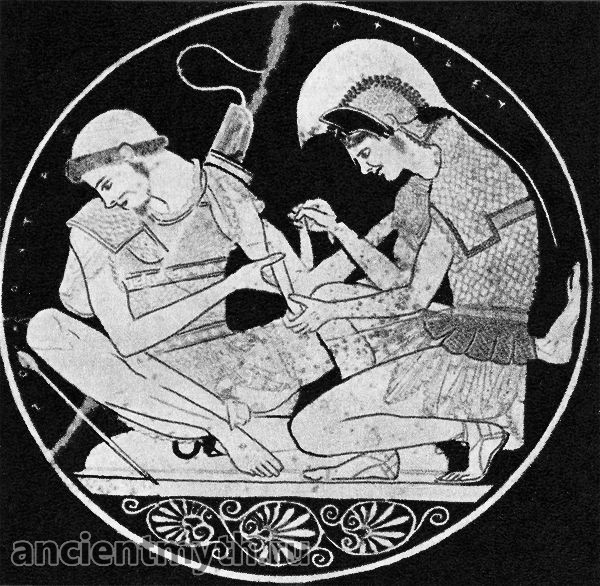Heroes of Greece in Mysia
All the heroes and their troops gathered in the harbor Aulide to sail from there to the shores of Troy. A huge army gathered on the seashore. There were a hundred thousand armed soldiers in this army. On 1186 ships, it was supposed to sail near Troy. Before leaving, all the leaders of the troops, great heroes, gathered under the shade of a hundred-year-old plane tree at the altars to offer sacrifices to the gods and pray them for a happy voyage. Suddenly a terrible serpent, red as blood, crawled out from under one of the altars. Twisting its huge body in rings, the snake quickly crawled up the sycamore tree to almost the top. There was a nest with eight chicks and a female. The red snake swallowed both the female and the chicks, and he turned into a stone. Amazed, the heroes stood under the plane tree; they could not understand what this sign of the gods meant. But the prophetic soothsayer Kalkhas revealed to them the meaning of this sign. He told the heroes that they would have to besiege Troy for nine years, since nine birds were swallowed up by a serpent, only in the tenth year after hard work they would take great Troy. The Greeks were pleased with the words of Calchas. Full of hope for a successful outcome of their campaign, they launched their ships. One by one, the ships sailed from the harbor of Aulis, the rowers pulled together on the oars, and the huge fleet of Greeks quickly sailed to the shores of Asia.

(Painting on a kilic.)
After a short voyage, the Greeks landed on the shores of Mysia. The son ruled here Hercules, hero Phone. The Greeks also stuck to his possessions. They were sure that they had reached the shores of Troy, and began to ravage the possessions of Telephus. He gathered an army of soldiers and moved at its head to defend his possessions. A bloody battle began.
Achilles joined the battle with his faithful friend Patroclus. Patroclus was wounded, but, ignoring the wound, he fought bravely next to Achilles.
Finally, with great difficulty, Achilles put Telephus to flight.
The coming night made it possible for the Phone to escape to its city and lock itself in it. Early in the morning the Greeks began to collect the bodies of the fallen soldiers and then suddenly found out that they were not fighting the Trojans, but with the Mysians and their king Telephus, the son of Hercules. The Greeks were saddened: they fought with their ally, not with the enemy. The Greeks made peace with Telephus, and he promised to help them. Only Tel refused to go with them on a campaign against Troy: he was married to Priam's daughter and did not want to fight against his wife's father.
Having buried the fallen in battle, the Greeks left Mysia and sailed further to the shores of Troy. In the open sea, a terrible storm caught the fleet of the Greeks. Like mountains, formidable waves rose on the sea. Like light splinters, the storm scattered the ships of the Greeks. They lost their way. The Greeks wandered for a long time by sea and finally returned to Aulis. One by one, the ships of the Greeks sailed to the harbor that they had left so recently to sail to the great Troy. Their first campaign ended in failure.